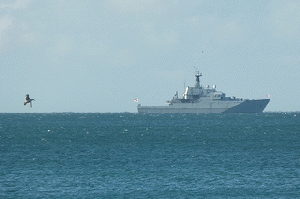Profile of a warship by Elsie esq.
During the last five years, the danger of war increased in Korea. Since Ms. Park was inaugurated as President, the danger of war has been increasing all the more. The war in Korea endangers the security of the world.
Stop War Games, Start Peace-Talks Statement Opposing U.S.-South Korea Joint Military Exercises Key Resolve Foal Eagle
March 4, 2013
The Korean War, known in the United States as "The Forgotten War," has never ended. Every year, the United States stages a series of massive joint war games with its ally, South Korea (ROK). These coordinated exercises are both virtual and real. Among other things, they practice live fire drills and simulate the invasion of North Korea--including first-strike options.
While we -- peace, human rights, faith-based, environmental, and Korean solidarity activists -- are deeply concerned about North Korea's third nuclear weapons test, we also oppose the U.S.-ROK joint war games as adding to the dangerous cycle of escalation of tensions on the Korean peninsula. North Korea views these war games as an act of provocation and threat of invasion like that which we have witnessed in Afghanistan, Iraq, and Libya, and routinely condemns these maneuvers as aimed at "bring[ing] down the DPRK by force" and forcing it to "bolster up the war deterrent physically." South Korean activists also decry the role of these war games in the hostile perpetuation of the division of the Korean peninsula and are often persecuted for their protests under South Korea's draconian National Security Law.
The U.S.-ROK "Key Resolve" and "Foal Eagle" annual war games, usually staged in March, and "Ulchi Freedom Guardian" in August, typically last for months and involve tens of thousands of U.S. troops stationed in South Korea and deployed from the United States, as well as hundreds of thousands of their ROK counterparts. U.S. Army, Navy, Air Force, Marine, and Space-Command forces will participate in these exercises and practice scenarios including the removal of North Korea's leadership, occupation of Pyeongyang, and reunification of the peninsula under U.S. and South Korean control.
In South Korea, peace and reunification groups have long opposed these war games. They have called for peninsula-wide demilitarization entailing the eventual removal of U.S. troops. As one organization puts it, "Unless and until US forces are completely and permanently withdrawn from South Korea, it will be impossible to establish peace on the Korean peninsula."
We call upon the U.S. and South Korean governments to stop the costly and provocative war games and take proactive steps to deescalate the current tensions on the Korean peninsula.
The Perils of the U.S. Pivot
In the past five years, hard-won efforts by the Korean people to ease North-South tensions have been reversed. Through its massive military buildup across the region, the United States has amplified regional tensions. Recent years have been witness to North Korea's nuclear and missile tests, increasing nationalism, and militarism in Japan (the world's sixth-greatest military spender), and a host of increasingly militarized territorial disputes. The global Cold War may have ended 20 years ago, but as the recent round of U.S.-led sanctions on the DPRK and threat of a third DPRK nuclear weapons "test" illustrate, the anachronism remains alive and well on the Korean peninsula.
Crisis on the Korean peninsula furnishes a rationale for U.S. militarization of the region, and the Pentagon has committed to deploy 60% of its air and naval forces to Asia and the Pacific to reinforce its air-sea-battle doctrine. Announced as the "pivot" of U.S. military resources to Asia and the Pacific, President Obama's policy, which necessitates more training areas, runways, ports of call, and barracks for the massive shift of U.S. military forces, disregards the impact of militarization on the lives of ordinary people in the region.
The disastrous ecological and human costs of this "pivot" are acutely apparent in the current construction of a naval base on Jeju, an "island of peace" in South Korea known for having the planet's densest concentration of UNESCO World Heritage Sites. Once celebrated for its pristine beauty and sea-based culture, Gangjeong, a 450-year-old fishing and farming village, is being torn to shreds by the South Korean government in collaboration with the United States, which can freely use any ROK military installation. Base construction crews are dredging acres of world-class, bio-diverse coral habitats and covering them with concrete. The obliteration of these coastal ecosystems also destroys the millennia-old livelihoods of the villagers, 94% of whom voted against the base in a local referendum. Gangjeong villagers are watching their heritage, economy, vibrant local culture, spiritual center, and very core of their identity collapse into rubble.
This same multi-faceted people's struggle is being played out in many places across the Asian Pacific. Within President Obama's "pivot" policy, U.S. bases in South Korea, Japan, Okinawa, Hawaii, and Guam are ever more important. Moreover, his administration has been pressing hard to open up previously closed U.S. bases in geostrategically vital nations such as Vietnam and the Philippines.
(Note: You can view every article as one long page if you sign up as an Advocate Member, or higher).





